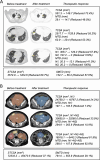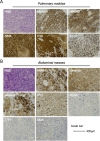TSC2-mutated perivascular epithelioid cell tumor with partial response to mTOR inhibition: a case report and literature review
- PMID: 40739411
- PMCID: PMC12311069
- DOI: 10.1007/s12672-025-03270-z
TSC2-mutated perivascular epithelioid cell tumor with partial response to mTOR inhibition: a case report and literature review
Abstract
Perivascular epithelioid cell tumors (PEComas), rare mesenchymal neoplasms with heterogeneous behavior, are molecularly characterized by TSC2 inactivation driving mammalian target of rapamycin (mTOR) pathway activation. We present a typical case of a 63-year-old female with metastatic high-grade PEComa featuring a TSC2 mutation (68.57% VAF) and elevated tumor mutational burden (19.7 mut/Mb), manifesting as peritoneal carcinomatosis and pulmonary metastases. Everolimus therapy following multidisciplinary assessment induced a radiologically confirmed partial response within 4.5 months with sustained clinical benefit. This outcome validates mTOR inhibition in TSC2-mutated PEComas and underscores the imperative of molecular profiling in mesenchymal tumor management. The significant mutational burden suggests potential immunotherapy responsiveness, informing future combination strategies. These findings emphasize molecularly guided precision approaches in rare malignancies and warrant systematic exploration of therapeutic sequencing and resistance mechanisms in mTOR-driven tumors.
Keywords: TSC2 mutation; mTOR inhibitor; Case report; Everolimus; PEComa.
© 2025. The Author(s).
Conflict of interest statement
Declarations. Ethics approval and consent to participate: The study was approved by the Ethics Committee of Peking University International Hospital, and the study was conducted in accordance with the WMA declaration of Helsinki. Consent for publication: Written informed consent for publication of this case report and any accompanying images was obtained from the patient’s legal guardian. Competing interests: The authors declare no competing interests.
Figures



Similar articles
-
PEComa with metastatic pulmonary embolism upon presentation: A case report.Radiol Case Rep. 2025 Jun 24;20(9):4561-4566. doi: 10.1016/j.radcr.2025.06.009. eCollection 2025 Sep. Radiol Case Rep. 2025. PMID: 40641843 Free PMC article.
-
Malignant Perivascular Epithelioid Cell Tumor (PEComa) of the Uterus: A Rare Type of Mesenchymal Tumors and a Management Challenge.Cancers (Basel). 2025 Jun 28;17(13):2185. doi: 10.3390/cancers17132185. Cancers (Basel). 2025. PMID: 40647483 Free PMC article. Review.
-
A systematic review: perivascular epithelioid cell tumor of gastrointestinal tract.Medicine (Baltimore). 2016 Jul;95(28):e3890. doi: 10.1097/MD.0000000000003890. Medicine (Baltimore). 2016. PMID: 27428182 Free PMC article.
-
A phase II study of everolimus in patients with advanced solid malignancies with TSC1, TSC2, NF1, NF2 or STK11 mutations.J Thorac Dis. 2021 Jul;13(7):4054-4062. doi: 10.21037/jtd-21-195. J Thorac Dis. 2021. PMID: 34422335 Free PMC article.
-
TFE3 -Rearranged PEComa/PEComa-like Neoplasms : Report of 25 New Cases Expanding the Clinicopathologic Spectrum and Highlighting its Association With Prior Exposure to Chemotherapy.Am J Surg Pathol. 2024 Jul 1;48(7):777-789. doi: 10.1097/PAS.0000000000002218. Epub 2024 Apr 10. Am J Surg Pathol. 2024. PMID: 38597260 Free PMC article. Review.
References
-
- Schoolmeester JK, Howitt BE, Hirsch MS, Dal Cin P, Quade BJ, Nucci MR. Perivascular epithelioid cell neoplasm (PEComa) of the gynecologic tract: clinicopathologic and immunohistochemical characterization of 16 cases. Am J Surg Pathol. 2014;38(2):176–88. - PubMed
-
- Xie S, Lu J, Dong J, Shen Z. A case report of a perivascular epithelioid cell tumor in the liver. Asian J Surg. 2023;46(11):5092–3. - PubMed
-
- Italiano A, Delcambre C, Hostein I, et al. Treatment with the mTOR inhibitor Temsirolimus in patients with malignant pecoma. Ann Oncol. 2010;21(5):1135–7. - PubMed
Grants and funding
LinkOut - more resources
Full Text Sources
Miscellaneous
